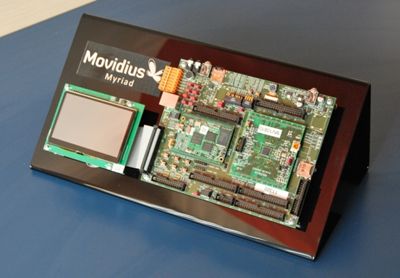From WikiChip
Difference between revisions of "movidius/myriad"
(→Myriad 1) |
(→Myriad 1) |
||
| Line 36: | Line 36: | ||
=== Myriad 1 === | === Myriad 1 === | ||
[[File:Movidius Myriad Eval Board.jpg|thumb|right|400px|Myriad 1 Evaluation Board]] | [[File:Movidius Myriad Eval Board.jpg|thumb|right|400px|Myriad 1 Evaluation Board]] | ||
| − | The Myriad 1 family of vision [[accelerators]] was introduced in [[2009]] and have undergone a number of enhancements along the way, each released under a new model and building on its predecessors. The Myriad 1 family is largely based on the {{movidius|SABRE}} test chip they've developed the prior year. This family first came to the public spotlight when they became the workhorse chips behind [[Google]]'s {{google|Project Tango}}. All the models have the same basic features: | + | The '''Myriad 1''' ('''MA11xx''') family of vision [[accelerators]] was introduced in [[2009]] and have undergone a number of enhancements along the way, each released under a new model and building on its predecessors. The Myriad 1 family is largely based on the {{movidius|SABRE}} test chip they've developed the prior year. This family first came to the public spotlight when they became the workhorse chips behind [[Google]]'s {{google|Project Tango}}. All the models have the same basic features: |
* [[Nona-core]] processor | * [[Nona-core]] processor | ||
Revision as of 14:57, 11 March 2018
| Myriad | |

| |
| Myriad 3D logo | |
| Developer | Movidius |
| Manufacturer | TSMC |
| Type | Neural Processors |
| Introduction | 2010 (announced) |
| Architecture | VLIW |
| µarch | SHAVE v2.0, SHAVE v3.0 |
| Process | 65 nm 0.065 μm , 28 nm6.5e-5 mm 0.028 μm , 16 nm2.8e-5 mm 0.016 μm
1.6e-5 mm |
| Technology | CMOS |
Myriad (also Myriad 3D Platform) is a family of ultra-low power hardware accelerators designed by Movidius specifically designed to accelerate vision processing.
Overview
| This section is empty; you can help add the missing info by editing this page. |
Members
Myriad 1
The Myriad 1 (MA11xx) family of vision accelerators was introduced in 2009 and have undergone a number of enhancements along the way, each released under a new model and building on its predecessors. The Myriad 1 family is largely based on the SABRE test chip they've developed the prior year. This family first came to the public spotlight when they became the workhorse chips behind Google's Project Tango. All the models have the same basic features:
- Nona-core processor
- Eight SHAVE v2.0 cores
- 1 SPARC LEON3 managing core
- 180 MHz
- TSMC's 65 nm process
- Up to 20 GFLOPS
- 1 MiB of shared memory (8x 128 KiB)
Models: (most of the differences are in the video capabilities of the chip)
- MA1100, advanced real-time video editing accelerator for smartphones
- MA1110, added support fr 720p 30fps video recording and playback, real-time video editing, inline video, and 12-megapixel captures
- MA1133, video streams accelerator for auto-stereoscopic screens for smartphones
- MA1135, specifically for 3D converter box applications
Myriad 2
See Also
Facts about "Myriad - Intel Movidius"
| designer | Movidius + |
| first announced | 2010 + |
| full page name | movidius/myriad + |
| instance of | integrated circuit family + |
| main designer | Movidius + |
| manufacturer | TSMC + |
| microarchitecture | SHAVE v2.0 + and SHAVE v3.0 + |
| name | Myriad + |
| process | 65 nm (0.065 μm, 6.5e-5 mm) +, 28 nm (0.028 μm, 2.8e-5 mm) + and 16 nm (0.016 μm, 1.6e-5 mm) + |
| technology | CMOS + |
